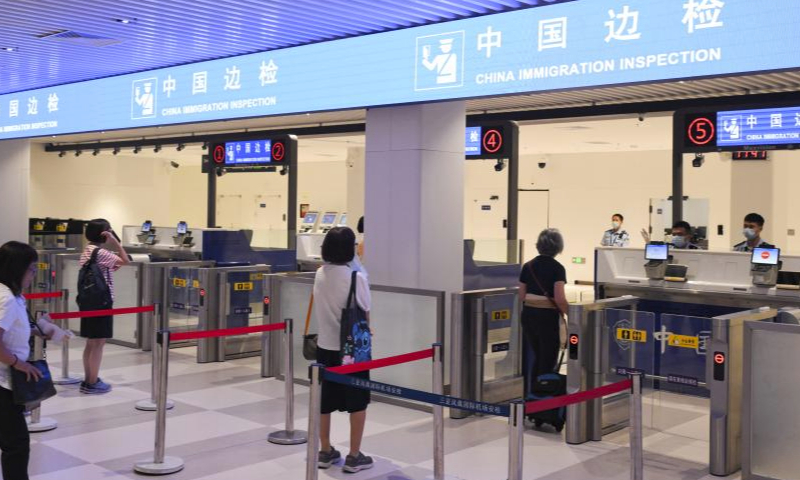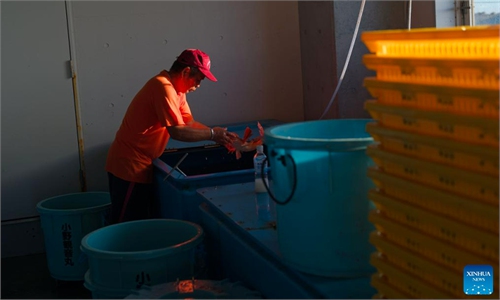China removes pre-entry COVID-19 testing
Change expected to boost inbound tourism to pre-pandemic level

Passengers go through border control at the international terminal of Sanya Phoenix International Airport in Sanya, south China's Hainan Province, July 26, 2023. The main works of the renovation and expansion project for the international terminal of Sanya Phoenix International Airport has been completed and put into use on July 1, as Hainan Province is preparing for island-wide independent customs operations by the end of 2025. (Xinhua/Yang Guanyu)
Starting from Wednesday, individuals traveling to China will no longer be required to undergo pre-entry COVID-19 nucleic acid or antigen testing. Analysts believe that this will benefit the inbound tourism market, which is expected to return to pre-pandemic levels in the first half of next year, with large-scale inbound tourists becoming a trend.
With the cancellation of self-declared testing results, China has lifted the last entry requirement related to the COVID-19 nearly eight months after reopening. In the post-pandemic era, China's domestic tourism industry has rebounded to 90 percent of pre-pandemic levels.
Observers in the field believe that the removal of pre-entry COVID-19 testing requirements will benefit the inbound tourism market. There will be a faster recovery in the first half of 2024, returning to pre-pandemic levels, as it is only a matter of time, Xu Xiaolei, marketing manager from CYTS Tours Holding Co, told the Global Times on Wednesday.
The announcement was made by Chinese Foreign Ministry Spokesperson Wang Wenbin during a regular press conference on Monday. Since January 8, China has opened its borders on a large scale, no longer implementing universal nucleic acid testing and quarantine for incoming travelers, and has also lifted restrictions on the number of international passenger flights.
Previously, passengers were required to submit a health declaration stating that they had undergone a polymerase chain reaction test with negative results within 48 hours prior to boarding. On April 29, the relevant regulations were further relaxed, allowing passengers traveling to China on international flights to substitute antigen testing for nucleic acid testing within 48 hours before boarding, and airlines no longer verified the testing certificates before boarding. Passengers must indicate "positive" or "negative" in the health condition section of the health declaration form. For many people, filling out the form is more of a formality, as it is difficult to verify the declaration since the testing is conducted by the travelers themselves.
After the gradual relaxation of entry restrictions in China, the number of groups and individuals consulting inbound travel agencies has been steadily increasing, with more than a dozen groups coming to consult every day, according to the manager of Love Fan International Travel Agency based in Wuhan, Central China's Hubei Province, on Wednesday.
"We have customers from Thailand, Singapore, the UK, and some European countries. Especially for those who want to study in China, they will want to visit China first," the manager told the Global Times.
"The change in entry policy also gives us more confidence to do a good job in international tourism. Not just tourism, but I think our whole economy and trade is amazing," she added.
According to data from the National Immigration Administration, there were a total of 168 million inbound and outbound trips in the first half of this year, about 49 percent of the pre-pandemic level in 2019. Although the specific number of inbound tourists is not available, the department stated that this number only includes 8.4 million foreigners. The domestic tourism industry is also calling for measures to support international inbound tourism.
At 10:25 am on Wednesday, the international passenger train No. 686 from Ulaanbaatar, Mongolia to Erenhot in North China's Inner Mongolia Autonomous Region, arrived at Erenhot Station. International passenger trains between China and Mongolia resumed operations after a 1,295-day suspension, marking the return of all passenger and freight transportation on roads and railways at Erenhot Port.
Hans Schwimmer from Germany said he has already applied for the visa and expects to go to Beijing on September 20.
"Because I particularly like to watch TikTok, I want to travel to China and consider settling down there. I will bring my family with me," he said.
According to Schwimmer, although there is a lot of negative information about China on Twitter and some media outlets, many Germans and Europeans still want to come to China. "Young people don't buy it anymore," he said.
Echoing Schwimmer, Tracy Lee, a international student from National University of Singapore, said she has always wanted to apply for the program of studying in China, and this policy change makes her look forward to studying and living in China even more.
"I have a lot of Chinese friends and they tell me that China is beautiful and I wish I could see it with my own eyes instead of seeing it from reports. This time I will go to see Huangshan Mountain and Mount Tai. I want to walk around the famous Yiwu market and eat a lot of Chinese food," Lee said.


